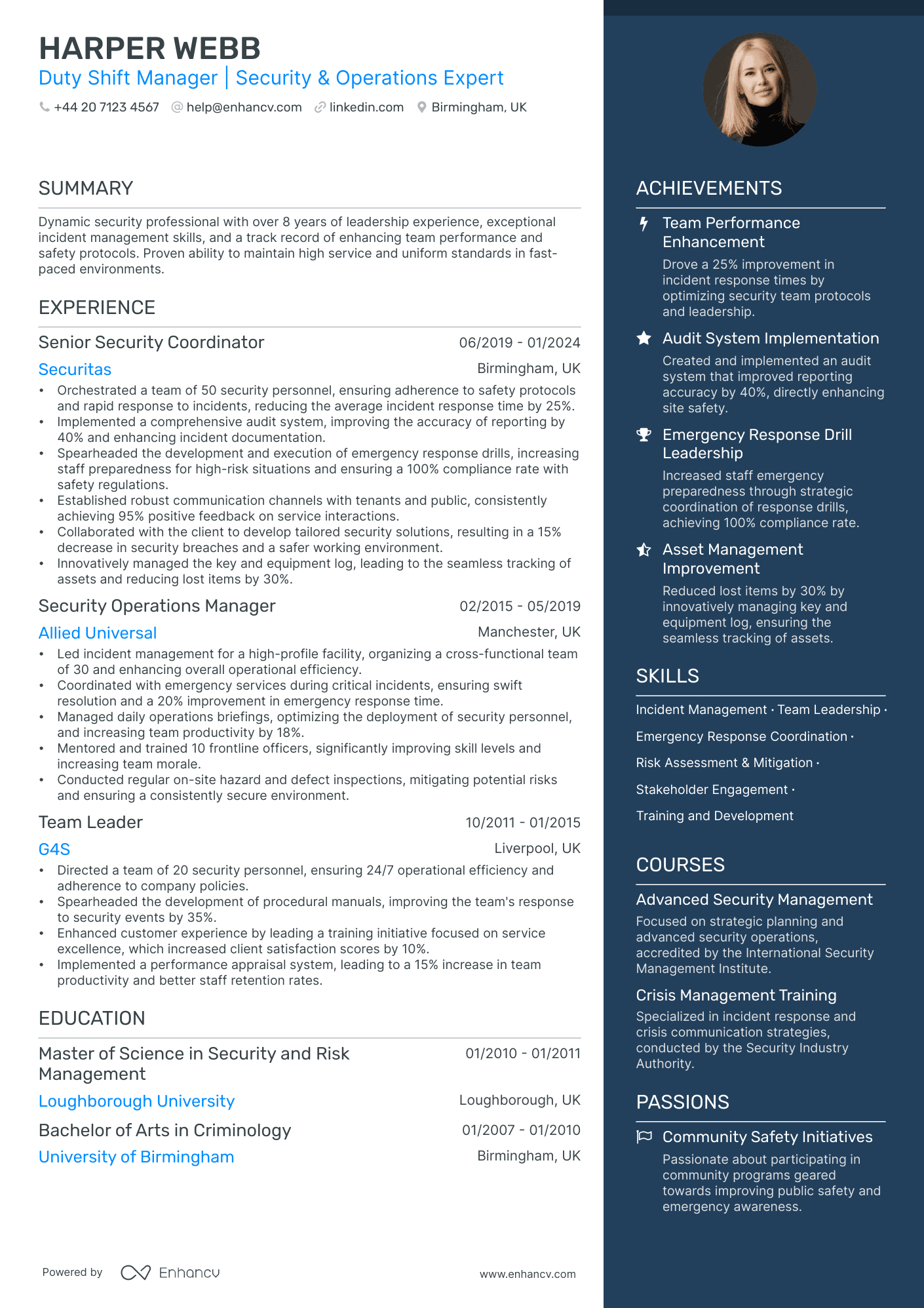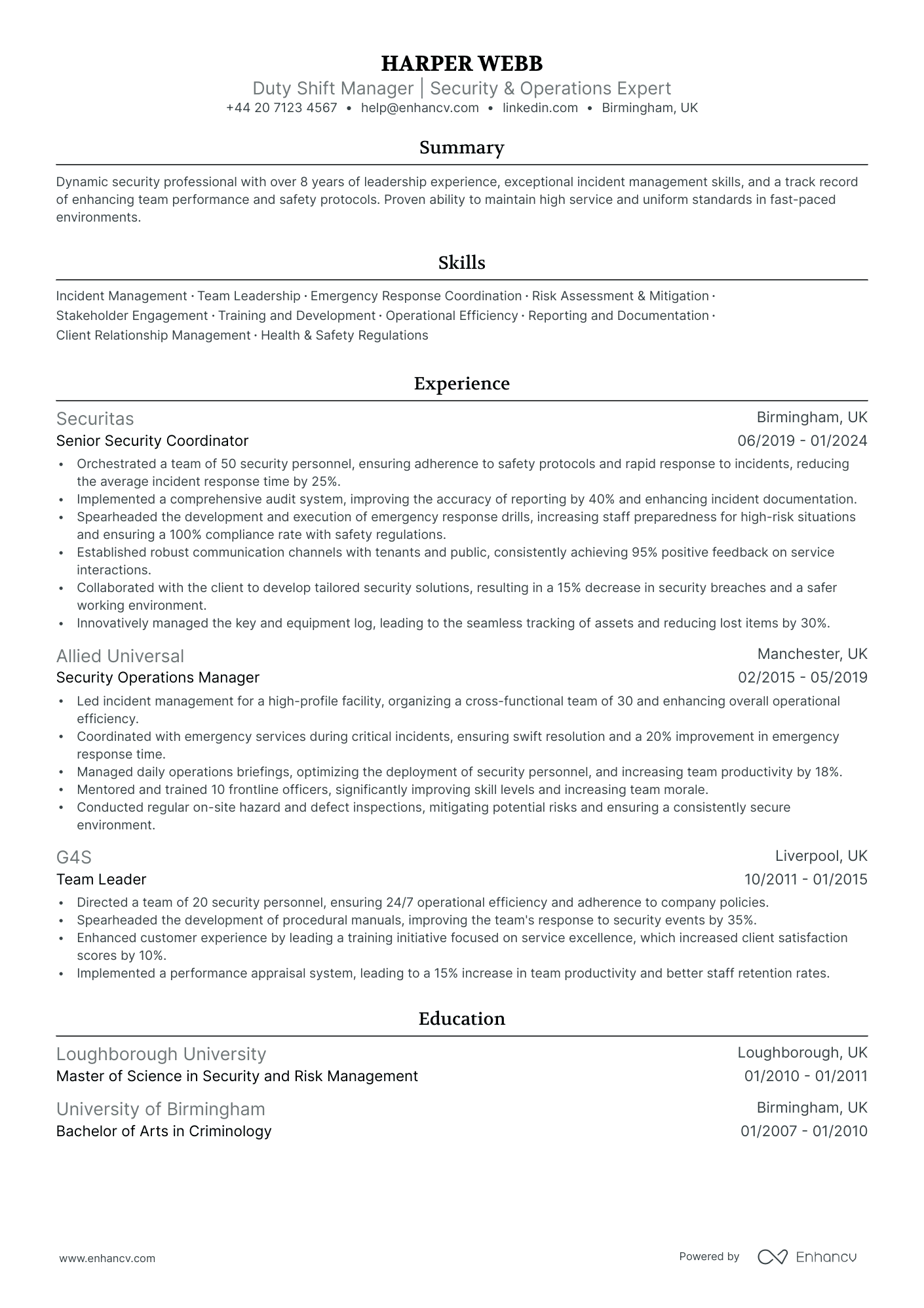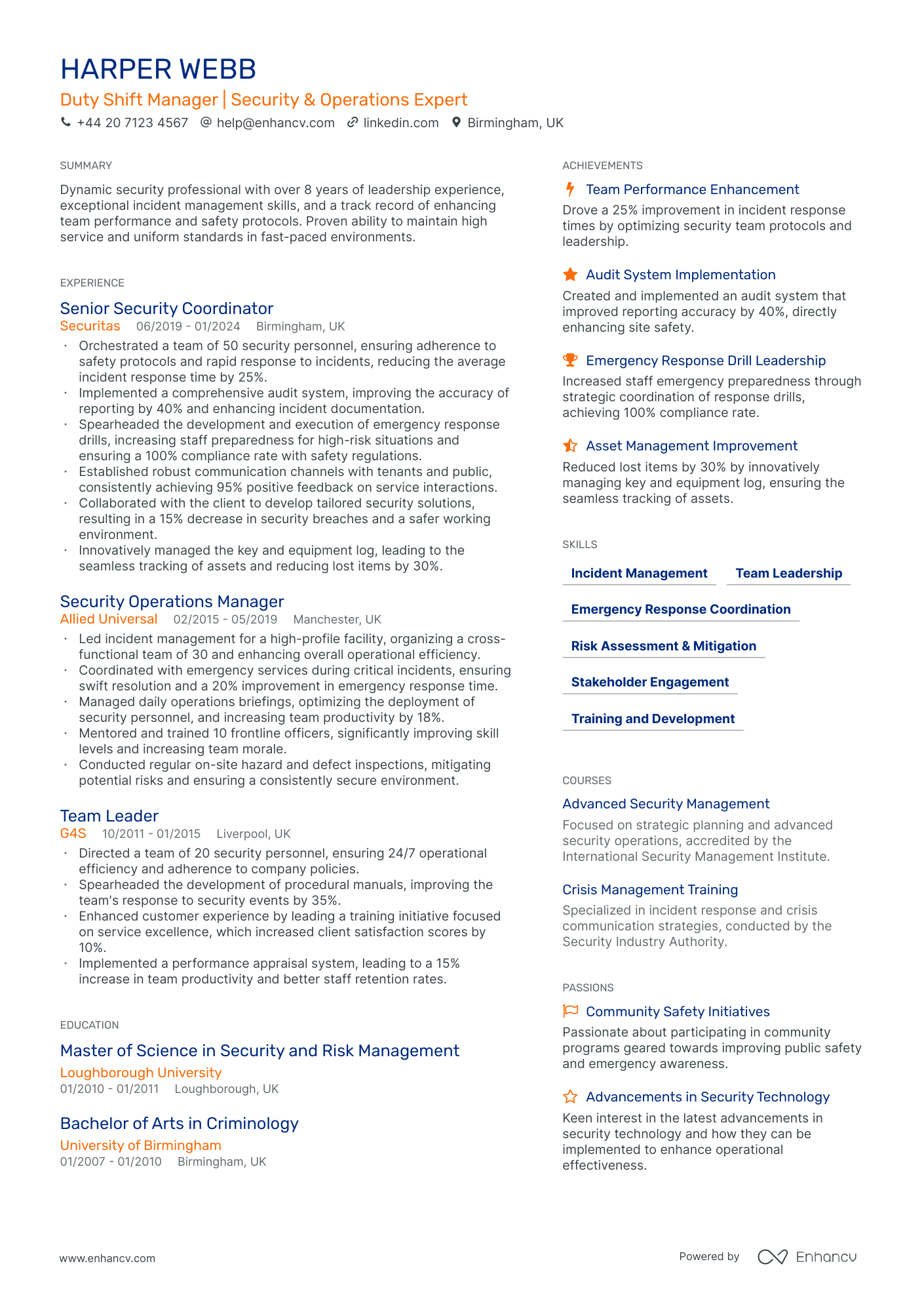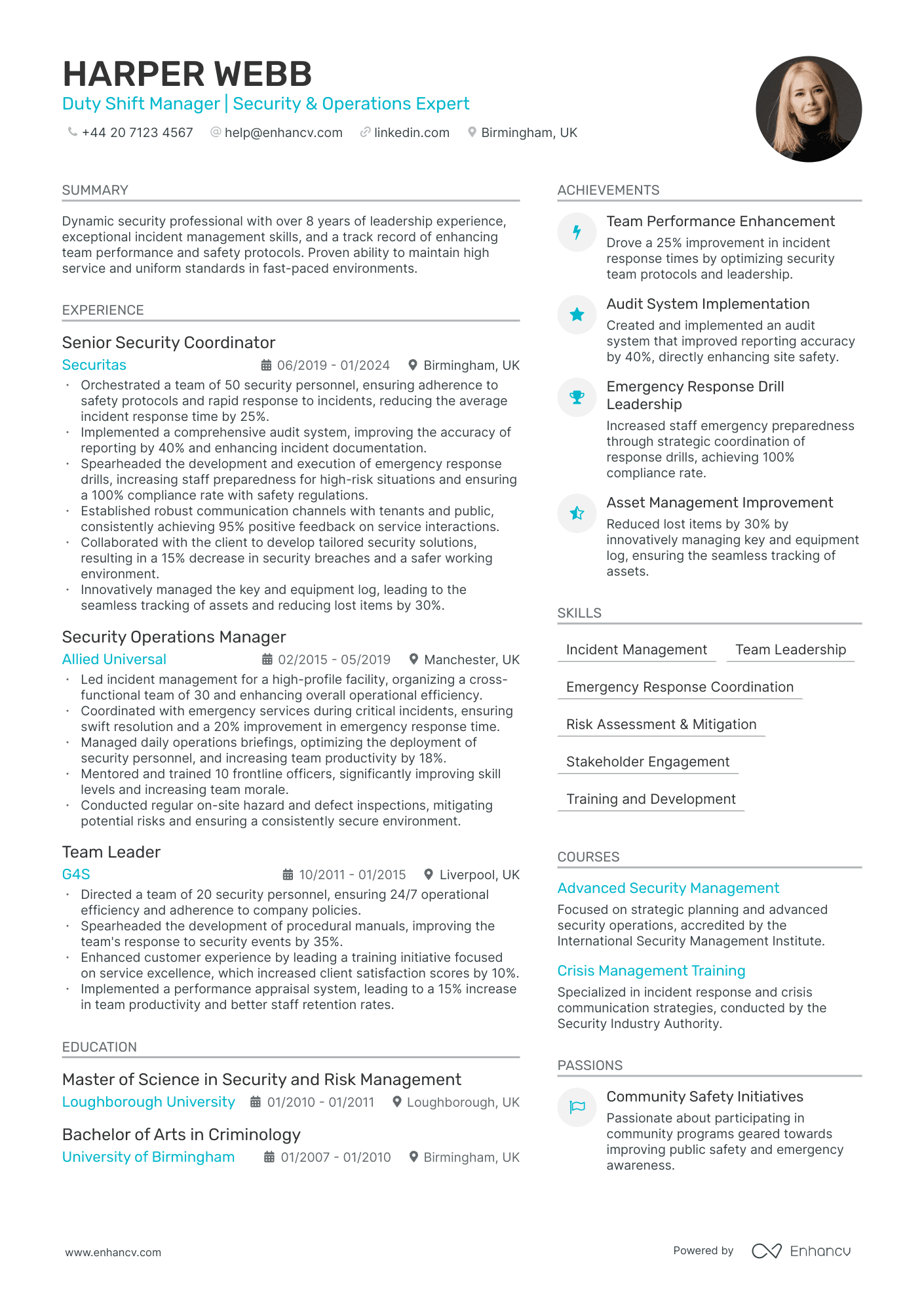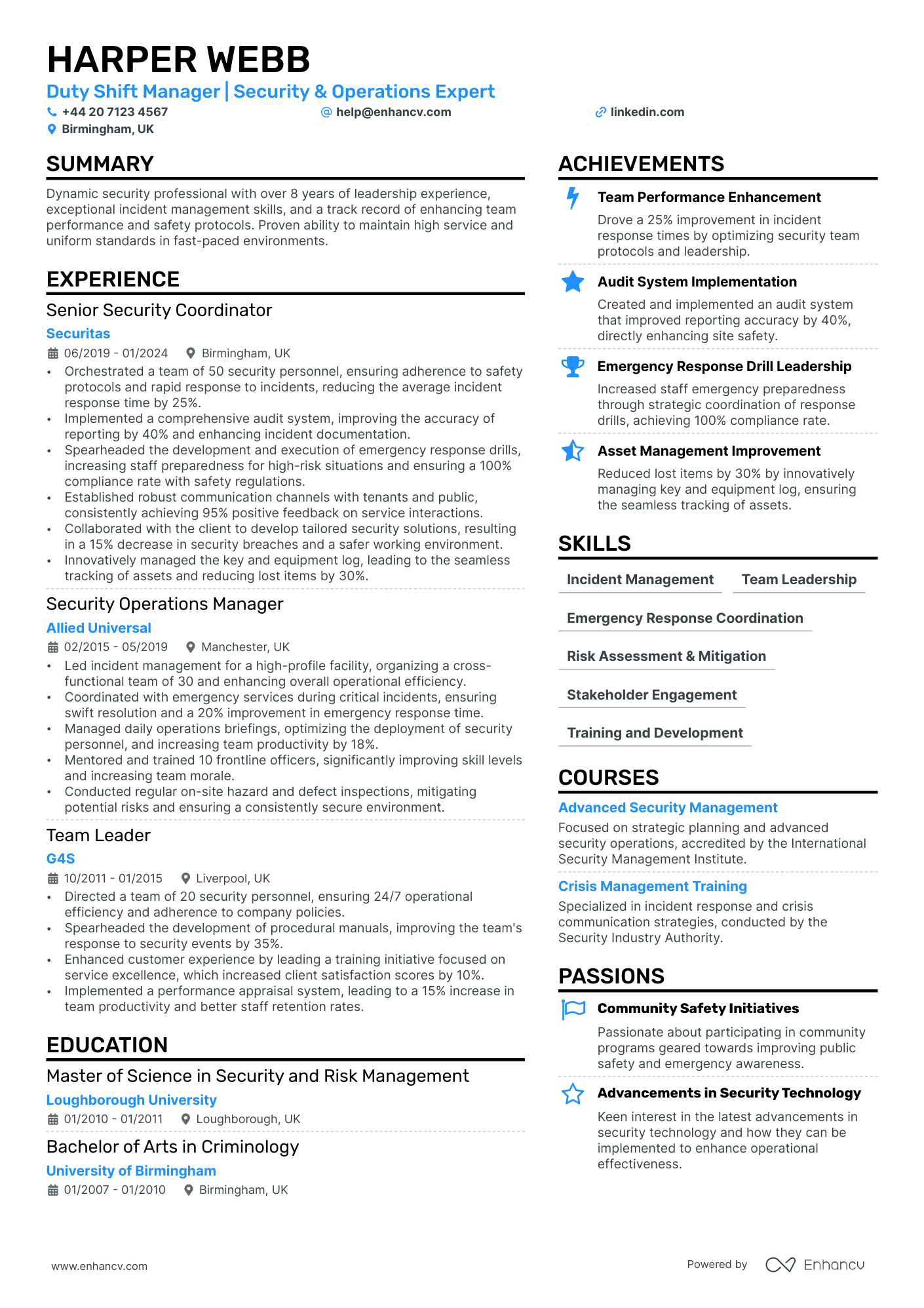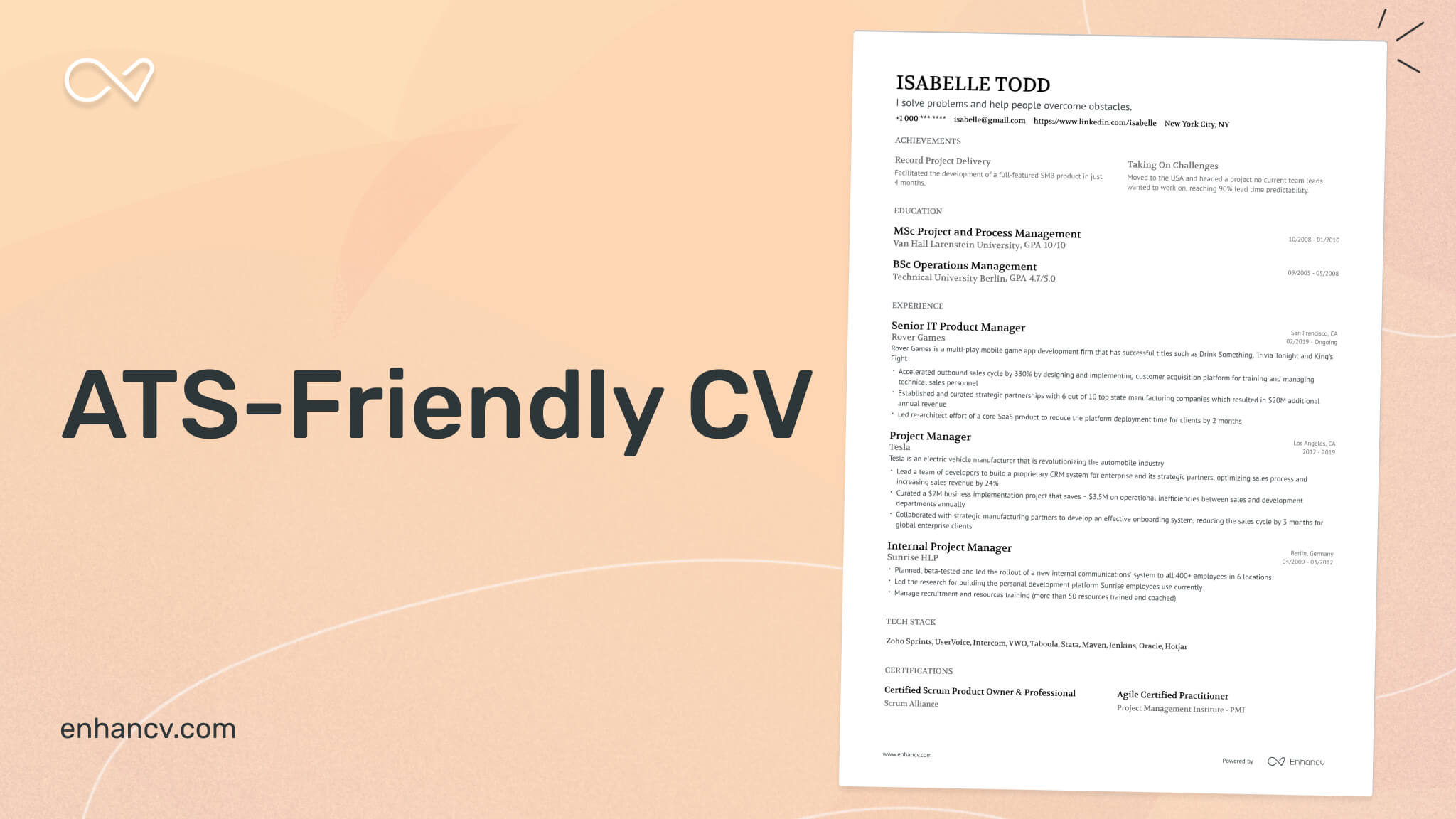Ensuring your CV captures the multifaceted expertise and leadership skills required for a security manager role can be a daunting task. Our guide offers tailored advice and structured examples to help you articulate your experiences effectively, showcasing your capabilities to potential employers.
- Answer job requirements with your security manager CV and experience;
- Curate your academic background and certificates, following industry-leading CV examples;
- Select from +10 niche skills to match the ideal candidate profile
- Write a more succinct experience section that consists of all the right details.
Do you need more specific insights into writing your security manager CV? Our guides focus on unique insights for each individual role:
Structuring your security manager CV layout: four factors to keep in mind
There are plenty of best practices out there for your CV layout and design. At the end of the day, a clear format and concise CV message should be your top priority. Use your CV design to enhance separate sections, bringing them to the forefront of recruiters' attention. At the same time, you can write content that:- Follows the reverse chronological order in the experience section by first listing your most recent jobs;
- Incorporates your contact information in the header, but do skip out on the CV photo for roles in the UK;
- Is spotlighted in the most important sections of your CV, e.g. the summary or objective, experience, education, etc. to show just how you meet the job requirements;
- Is no longer than two-pages. Often, the one-page format can be optimal for your security manager CV.
Before submitting your CV, you may wonder whether to export it in Doc or PDF. With the PDF format, your information and layout stay intact. This is quite useful when your CV is assessed by the Applicant Tracker System (or the ATS) . The ATS is a software that scans your profile for all relevant information and can easily understand latest study on the ATS , which looks at your CV columns, design, and so much more.
PRO TIP
For certain fields, consider including infographics or visual elements to represent skills or achievements, but ensure they are simple, professional, and enhance rather than clutter the information.
The top sections on a security manager CV
- Professional Summary showcases the candidate's overall security expertise.
- Relevant Security Experience highlights specific work history in security management.
- Security Clearances outline any government or industry-specific clearances held.
- Risk Assessment & Management underlines the ability to evaluate and mitigate risks.
- Technology Proficiency details knowledge of security-related hardware and software.
What recruiters value on your CV:
- Highlight your expertise in risk assessment and mitigation by providing concrete examples of how you've effectively managed potential threats and secured assets, demonstrating your proactive approach to security management.
- Emphasise your experience with security protocols and technology, detailing your proficiency with the latest security systems and your ability to integrate technology solutions to enhance overall safety.
- Focus on your leadership and communication skills, explaining how you've led cross-functional teams and conducted security training sessions to cultivate a security-aware culture within an organisation.
- Showcase your knowledge of legal and regulatory compliance, including your experience with data protection laws, and industry-specific security standards, to present yourself as a well-informed and responsible security manager.
- Include any relevant certifications such as Certified Protection Professional (CPP) or Chartered Security Professional (CSyP), as this demonstrates your commitment to professional development and your expertise within the security field.
Recommended reads:
Our checklist for the must-have information in your security manager CV header
Right at the very top of your security manager CV is where you'd find the header section or the space for your contact details, headline, and professional photo. Wondering how to present your the name of the city you live in and the country abbreviation as your address;
- are tailored to the role you're applying for by integrating key job skills and requirements;
- showcase what your unique value is, most often in the form of your most noteworthy accomplishment;
- select your relevant qualifications, skills, or current role to pass the Applicant Tracker System (ATS) assessment. Still not sure how to write your CV headline? Our examples below showcase best practices on creating effective headlines:
Examples of good CV headlines for security manager:
- Head of Cybersecurity | CISSP Certified | Risk Management Expert | 10+ Years of Progressive Leadership Experience
- Information Security Manager | Data Protection Specialist | GDPR Compliance | Strategic Planning | 8 Years in Sector
- Corporate Security Director | Physical Security Integration | Crisis Response Leader | CPP Holder | 15 Years' Experience
- IT Security Manager | Network Defence Architect | Cloud Security Solutions | CEH | 12 Years' Expertise
- Senior Security Consultant | Fraud Prevention & Investigations | Financial Sector Specialist | CISM Certified | 9 Years
- Security Operations Manager | Access Control Systems | Event Security Coordination | SIA Licensed | 7 Years Field Leadership
Your security manager CV introduction: selecting between a summary and an objective
security manager candidates often wonder how to start writing their resumes. More specifically, how exactly can they use their opening statements to build a connection with recruiters, showcase their relevant skills, and spotlight job alignment. A tricky situation, we know. When crafting you security manager CV select between:
- A summary - to show an overview of your career so far, including your most significant achievements.
- An objective - to show a conscise overview of your career dreams and aspirations.
Find out more examples and ultimately, decide which type of opening statement will fit your profile in the next section of our guide:
CV summaries for a security manager job:
- Seasoned Security Manager with over a decade of experience in safeguarding corporate assets, leading cross-functional security teams, and developing resilient security architectures. Expertise in cyber threat intelligence and incident response strategies. Successfully reduced security breaches by 40% at a Fortune 500 company through innovative security solutions.
- Dedicated Security Supervisor with 8 years of front-line experience, specialising in implementing comprehensive security protocols in high-threat environments. Proficient in risk assessment and security operations management. Spearheaded a 30% improvement in security efficiency within a global financial institution.
- Former Law Enforcement Officer transitioning to Corporate Security Management with 5 years of experience in crime prevention and investigative work. Proven analytical and emergency response skills, with a commitment to translating public safety experience to a corporate setting, aiming to enhance organisational security measures.
- Accomplished IT Professional with 12 years in network systems administration, pivoting into Security Management. Deep understanding of digital infrastructure vulnerabilities and certifications in network security. Eager to apply robust technical background to protect against emerging cyber threats and ensure data integrity.
- Aspiring to pivot my 4-year professional experience in customer service management into Security Management. With strong communication skills and a talent for crisis management, I aim to learn rapidly and contribute to the safety and security operations of a dynamic organisation.
- Seeking to leverage my degree in Criminology and passion for technology to embark on a career in Security Management. Keen to develop practical skills in security strategy and incident analysis, and contribute to upholding the highest standards of safety and security within a fast-paced environment.
How to meet job requirements with your security manager CV experience
We've now reached the essence of your actual CV - your experience section. This is the space where you can list your career roles and on-the-job successes. Many candidates tend to underestimate just how much time and effort they should put into writing this CV section. Your experience shouldn't be a random list of your responsibilities, but instead:
- Match the job description with your skills, values, and accomplishments;
- Start each bullet with a strong action verb, followed up with one key skill and your outcome of applying this skill;
- Spotlight parts of your career history that are relevant to the job you're applying for.
Before we move on, make sure to check out some professional CV experience sections.
Best practices for your CV's work experience section
- Developed and implemented comprehensive security policies, procedures, and protocols to mitigate risks and ensure compliance with industry standards and regulations.
- Led a team of security professionals, providing training, direction, and performance evaluations to maintain high levels of efficiency and effectiveness in security operations.
- Conducted regular risk assessments and audits to identify potential threats and vulnerabilities, formulating strategic plans to address discovered gaps in security.
- Managed the installation and maintenance of security systems, including CCTV, access control, and alarm systems, ensuring optimal functionality and coverage.
- Communicated effectively with internal and external stakeholders on security matters, fostering collaboration and understanding of security requirements and initiatives.
- Responded to emergency situations and security incidents with decisiveness, coordinating with law enforcement and emergency services when necessary for resolution and reporting.
- Oversaw the budget for security operations, ensuring the efficient allocation of resources and cost-effective deployment of security measures and personnel.
- Stayed abreast of the latest security trends and technologies, evaluating and advocating for the adoption of new solutions that could enhance organisational security posture.
- Handled the investigation of security breaches and violations, documenting incidents and providing recommendations for preventing future occurrences.
- Developed and implemented a comprehensive security strategy for a global financial institution, leading a team of 50 security professionals.
- Spearheaded the integration of advanced surveillance technology and cyber security measures resulting in a 30% decrease in security breaches annually.
- Conducted detailed risk assessments and security audits across various international branches, ensuring regulatory compliance and identifying critical improvement areas.
- Managed the security operations for all retail locations across the UK for a leading chain, culminating in a 25% reduction in shrinkage due to theft over 3 years.
- Orchestrated a successful security overhaul that included staff retraining, policy updates, and technological upgrades in surveillance systems.
- Established collaborative relationships with local law enforcement and community organizations to bolster security measures and emergency response protocols.
- Oversaw the security infrastructure for a foremost data centre provider, ensuring the physical and cyber protection of critical IT assets for over 100 corporate clients.
- Coordinated with IT departments to develop robust policies for data integrity and disaster recovery, significantly reducing potential downtime due to security incidents.
- Implemented employee security awareness training programmes, contributing to a highly vigilant workplace culture and lowering internal threats by 40%.
- Directed the establishment of an end-to-end security protocol for a newly constructed luxury hotel, covering staff, guest safety, and asset protection.
- Negotiated contracts with security vendors for state-of-the-art monitoring equipment, ensuring coverage of all critical access points without compromising on aesthetics.
- Facilitated crisis management and emergency response drills regularly, greatly enhancing the preparedness of the hotel staff in various threat scenarios.
- Led the strategic planning and execution of security systems for international manufacturing operations, focusing on both cyber and physical threats to the supply chain.
- Performed cross-functional team leadership, improving communication between departments and ensuring alignment of security protocols with production timelines.
- Drove the adoption of innovative security technologies, resulting in enhanced tracking and monitoring of sensitive materials.
- Overhauled the security program for an established tech company, addressing emerging risks in information security and digital asset protection.
- Developed a comprehensive cyber resilience framework, significantly mitigating risks associated with cyber threats and safeguarding intellectual property.
- Cultivated a security-centric organizational culture by providing continuous staff training on security best practices and threat identification.
- Played a pivotal role in protecting the company’s assets and staff during a period of expansion by establishing security measures for 10+ new stores across the UK.
- Leveraged analytic tools to monitor security footage effectively, reducing false positives in theft detection by 50%, and recovering thousands of pounds in merchandise.
- Instituted loss prevention training for over 500 employees, greatly reducing the incidence of internal theft and enhancing overall security protocol compliance.
- Managed security projects involving the safeguarding critical infrastructure, focusing on perimeter defence and access control for utilities facilities across the UK.
- Collaborated with government agencies on national security directives and ensured full compliance with stringent regulatory standards while maintaining operational efficiency.
- Initiated the redesign of incident response policies, which led to a 45% faster reaction time to security threats and a more resilient response framework.
Lacking professional expertise: how to write your CV to highlight your best talents
Don't count on your lucky stars when you're applying for a role, where you happen to have less (or almost none) professional experience. Recruiters sometimes do hire inexperienced candidates if they're able to present their unique value from the get-go. So, instead of opting for the traditional, CV experience section:
- List any applicable expertise you happen to have - no matter if it's a part-time job, internship, or volunteer work. This would hint to recruiters that your profile is relevant;
- Focus your CV on your transferrable skills or talents you've obtained thanks to your whole life and work experience. In effect, you'll be spotlighting your value as a candidate;
- Separate more space for your applicable academic background and certificates to show you have the technical know-how;
- Ensure that within your objective, you've defined why you'll like the job and how you'll be the perfect match for it. Always ensure you've tailored your CV to individual applications.
Looking for more good examples for your first job? We'll show you how other candidates, with less professional experience, have created their job-winning CVs.
Recommended reads:
PRO TIP
Talk about any positive changes you helped bring about in your previous jobs, like improving a process or helping increase efficiency.
The CV skills' divide: between hard and soft skills
Of course, you may have read the job requirements plenty of times now, but it's key to note that there is a difference between technical and personal skills. Both are equally relevant to your job application. When writing about your skill set, ensure you've copy-pasted the precise skill from the job requirement. This would not only help you ensure you have the correct spelling, but also pass any Applicant Tracker System (ATS) assessments.
- Hard skills show your technological capabilities. Or whether you'll be a good technical fit to the organisation. Ensure you've spotlighted your hard skills in various sections of your CV (e.g. skills section, projects, experience) by including the technology and what you've attained;
- Soft skills pinpoint your personality and people or communication skills, hinting at if you'll easily accomodate into the team or organisation. Quantify your soft skills in your CV achievements, strengths, summary/objective, and experience sections. Always support your soft skills with how they've helped you grow as a professional.
Top skills for your security manager CV:
Risk Assessment
Security Protocols
Emergency Response Planning
Surveillance Systems
Access Control Systems
Physical Security
Investigation Techniques
Crisis Management
Cybersecurity Fundamentals
Regulatory Compliance
Leadership
Communication
Problem-Solving
Decision Making
Attention to Detail
Strategic Thinking
Teamwork
Adaptability
Integrity
Stress Management
PRO TIP
If there's a noticeable gap in your skillset for the role you're applying for, mention any steps you're taking to acquire these skills, such as online courses or self-study.
Listing your university education and certificates on your security manager CV
The best proof of your technical capabilities would be your education and certifications sections. Your education should list all of your relevant university degrees, followed up by their start and completion dates. Make sure to also include the name of the university/-ies you graduated from. If you happen to have less professional experience (or you deem it would be impressive and relevant to your application), spotlight in the education section:
- that you were awarded a "First" degree;
- industry-specific coursework and projects;
- extracurricular clubs, societies, and activities.
When selecting your certificates, first ask yourself how applicable they'd be to the role. Ater your initial assessment, write the certificate and institution name. Don't miss out on including the completion date. In the below panel, we've curated relevant examples of industry-leading certificates.
PRO TIP
If there's a noticeable gap in your skillset for the role you're applying for, mention any steps you're taking to acquire these skills, such as online courses or self-study.
Recommended reads:
Key takeaways
What matters most in your security manager CV-writing process is for you to create a personalised application. One that matches the role and also showcases your unique qualities and talents.
- Use the format to supplement the actual content, to stand out, and to ensure your CV experience is easy to comprehend and follows a logic;
- Invest time in building a succinct CV top one third. One that includes a header (with your contact details and headline), a summary or an objective statement (select the one that best fits your experience), and - potentially - a dedicated skills section or achievements (to fit both hard skills and soft skills requirements);
- Prioritise your most relevant (and senior) experience closer to the top of your CV. Always ensure you're following the "power verb, skill, and achievement" format for your bullets;
- Integrate both your technical and communication background across different sections of your CV to meet the job requirements;
- List your relevant education and certificates to fill in gaps in your CV history and prove to recrutiers you have relevant technical know-how.
